The Benefits of AI Chatbot Roleplay in Different Sectors
Discover the impact of AI chatbot roleplay in different industries. Learn how roleplaying AI can revolutionize your approach on our blog.

The rise of AI chatbot roleplay is transforming various industries. Its growing role is seen in education, healthcare, corporate training, customer service, and entertainment. AI chatbots simulate real-world scenarios that provide dynamic interactions and personalized experiences. These bots enhance skills and streamline processes, making AI chatbots an invaluable tool for businesses and individuals.
At Kindroid, our advanced multimodal AI system offers a new level of AI companions. Unlike standard chatbots, our technology provides realistic appearances and voices. With customizable personalities and a robust memory system, our users experience deep, meaningful connections through voice chat. This unfiltered approach ensures maximum freedom and authenticity for private use, which revolutionizes how people interact with chatbots.
In line with our professional expertise, we’ve created this guide to explore how AI-driven roleplay chatbots can benefit sectors like education, healthcare, and customer service. We’ll delve into how chatbots simulate real-world scenarios for training, provide personalized AI companions for voice chat, and streamline processes in various industries. At the end of this blog, you will understand how AI chatbot roleplay enhances apps, bots, and much more.
Let’s dive in!
Advantages of AI Chatbot Roleplay Across Various Industries
AI chatbot roleplay is becoming a powerful tool across various industries, transforming interactions in education, healthcare, corporate training, and entertainment. Through dynamic, personalized experiences, AI chatbots simulate real-life scenarios, enhancing skills, improving customer engagement, and providing innovative solutions for businesses and individuals across sectors.
1. AI Chatbot Roleplay in Education
AI chatbots have transformed education by simulating real-world scenarios and encouraging students to engage in problem-solving, critical thinking, and language skills. This innovative approach enhances learning experiences, making lessons more interactive and personalized. The use of AI chatbots helps educators reach students in new, dynamic ways, offering flexibility and immediate feedback.
Practical Applications of AI Chatbot Roleplay in Classrooms
AI chatbot roleplay is used in classrooms to bring theory to life through interactive, scenario-based learning. These practical applications show how AI changes and how students engage with educational content.
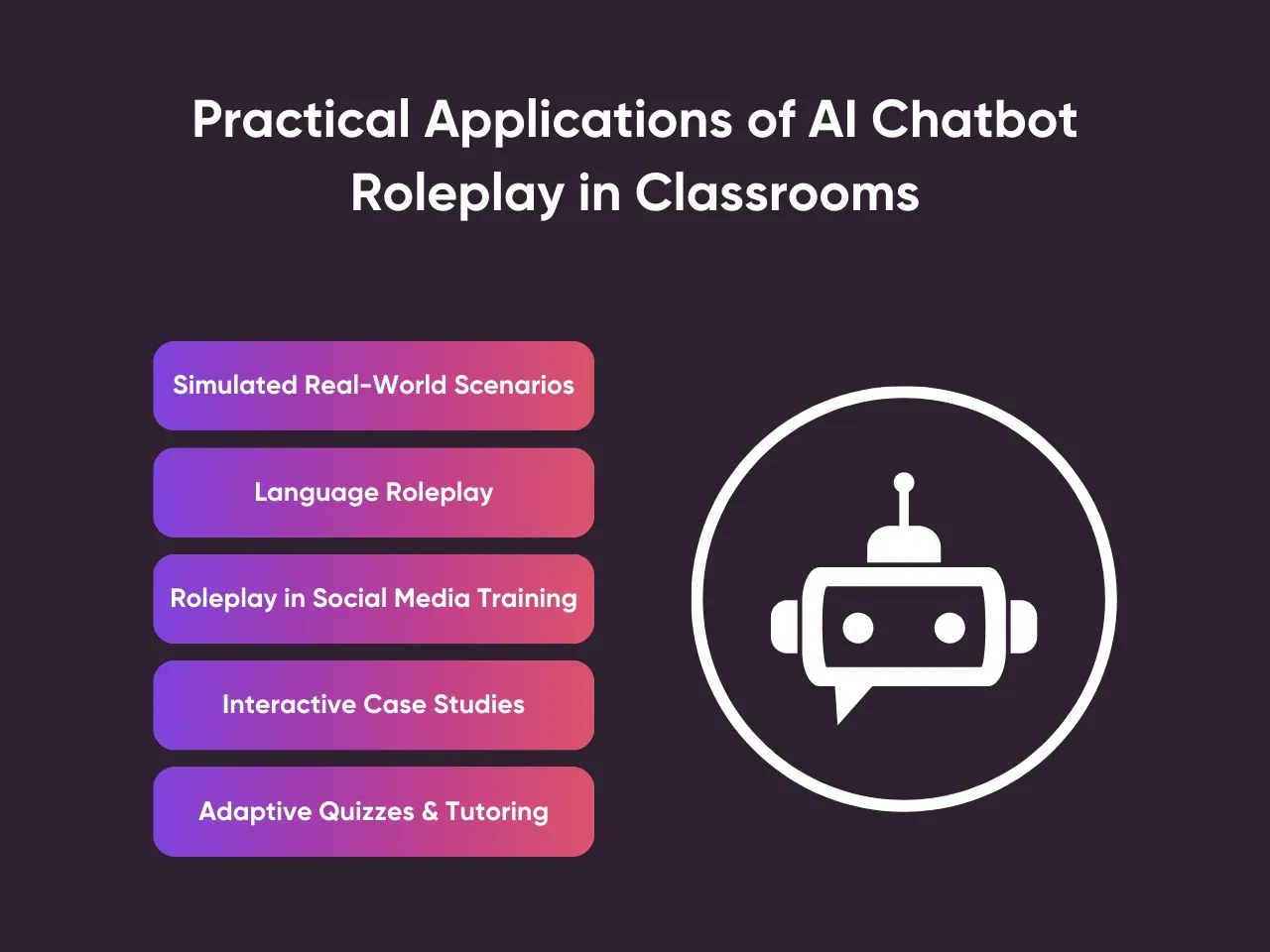
- Simulated Real-World Scenarios: AI chatbots offer role-play scenarios where students practice real-life situations, such as customer service or medical diagnoses. This prepares students for careers in various fields and helps them develop practical skills.
- Language Roleplay for Communication Skills: In language classes, an AI chatbot helps students practice speaking in different contexts. Students can experience various dialogue settings with the chatbot, whether ordering food or having a formal conversation.
- Roleplay in Social Media Training: AI chatbot can simulate social media interactions, helping students learn effective communication techniques for social media management. This prepares them for careers in marketing or content creation.
- Interactive Case Studies: In subjects like business or law, an AI chatbot can simulate case studies in which students must navigate complex situations. This allows them to apply theoretical knowledge to practical scenarios.
- Adaptive Quizzes and Tutoring: AI chatbots can offer roleplaying quizzes that adapt to the student’s performance. If a student struggles, the chatbot can adjust the difficulty or provide additional guidance to help them succeed.
The practical applications of AI chatbots in classrooms are diverse and impactful. From language learning to specialized training in fields like social media or business, AI chatbots offer a dynamic, hands-on approach to education. This technology encourages active participation, making lessons more memorable and effective.
Challenges and Considerations of Using AI Chatbots in Education
While AI chatbot roleplay offers many advantages, it also comes with challenges that educators and institutions must address to optimize its use in the classroom.
- Limited Emotional Understanding: AI chatbots may struggle to understand students' emotional nuances. Unlike human teachers, AI cannot easily interpret a student’s frustration or anxiety, which can hinder learning later on.
- Technical Limitations: Some educational settings may lack the infrastructure to support advanced AI chatbots. Without reliable internet access or adequate devices, students may not experience the full benefits of an AI chatbot.
- Data Privacy Concerns: AI chatbots often require personal data to offer personalized tutoring. This raises concerns about storing and using student information, requiring strict privacy policies and regulations.
- Over-reliance on Technology: There’s a risk that students may become too dependent on AI chatbots for learning, which could reduce critical thinking and problem-solving skills if not balanced with traditional teaching methods.
- Cost of Implementation: Implementing AI chatbot systems can be expensive for schools, particularly in underfunded regions. The high cost of developing and maintaining AI chatbots may limit their widespread adoption.
While AI chatbot roleplay offers exciting education possibilities, addressing these challenges is essential. Schools must consider the benefits and limitations of integrating AI technology into the classroom. With proper planning and resources, AI chatbots can enhance education, but it’s vital to maintain a balanced approach that also values human interaction.
2. AI Chatbot Roleplay in Healthcare
AI chatbots have emerged as valuable tools in healthcare. They enable medical professionals to enhance their skills and improve patient care. Chatbots offer a safe and controlled practice environment through simulated interactions, providing patients and providers with numerous benefits.
Use Cases of AI Chatbot Roleplay in Healthcare
AI chatbot roleplay provides various applications in healthcare, from training medical professionals to patient engagement.
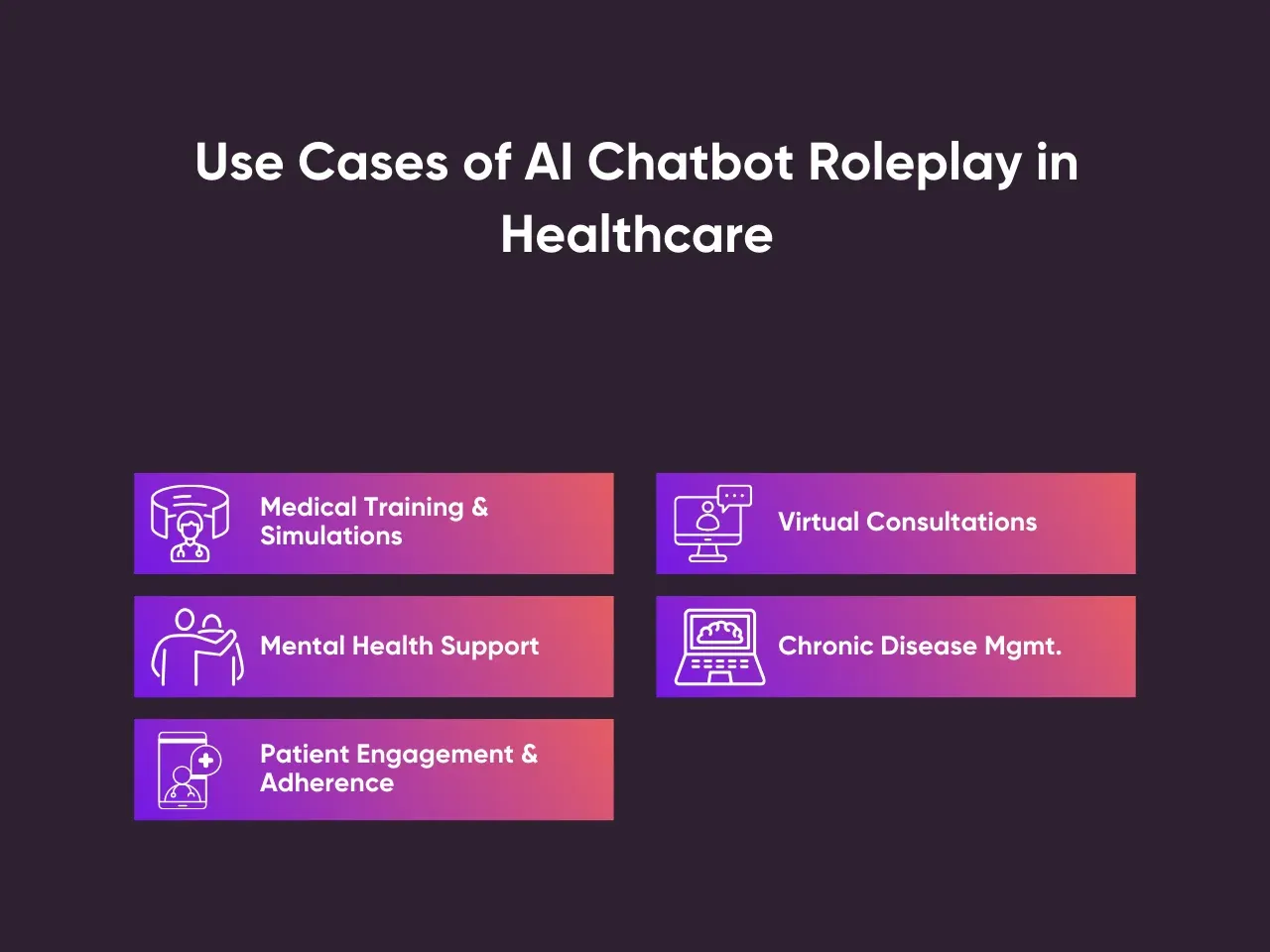
- Medical Training and Simulations: AI chatbots simulate patient interactions, helping medical professionals practice diagnosing conditions, improve communication, and refine bedside manners.
- Mental Health Support: AI chatbots are crucial in mental health care. Through guided conversations and therapeutic interventions, they offer support to patients dealing with anxiety, depression, and other mental health issues.
- Patient Engagement and Adherence: Healthcare organizations use AI chatbots to engage patients in treatment. Through reminders and follow-up roleplaying scenarios, chatbots help patients stay on track with medication schedules and appointments. This can improve adherence to treatment plans.
- Virtual Consultations: Chatbots assist in preliminary patient assessments through roleplay. Medical professionals can ask relevant questions and gather information faster and more efficiently.
- Chronic Disease Management: AI chatbots engage patients with chronic conditions. They can simulate potential health scenarios and provide advice based on symptoms or real-time data from wearables.
AI chatbot roleplay offers tremendous value in healthcare, aiding medical professionals and patients. Medical professionals can enhance their skills through realistic simulations. At the same time, patients receive guidance and support in areas like mental health and chronic disease management. With these benefits, integrating AI chatbots will likely become critical in patient care and medical training as healthcare evolves.
3. AI Chatbot Roleplay in Customer Service
AI chatbots are transforming customer service, offering quick and efficient responses to common queries. Chatbots enhance the customer experience by simulating human interactions and providing solutions with minimal delay. Their ability to roleplay allows them to handle a variety of scenarios, ensuring consistent and reliable service.
How AI Chatbots Use Roleplay to Improve Customer Experience
Companies find AI chatbots valuable because they can recreate everyday customer service interactions. They deliver round-the-clock assistance, handle frequent inquiries, and streamline operations. Here's how AI chatbots use roleplay to enhance customer service:
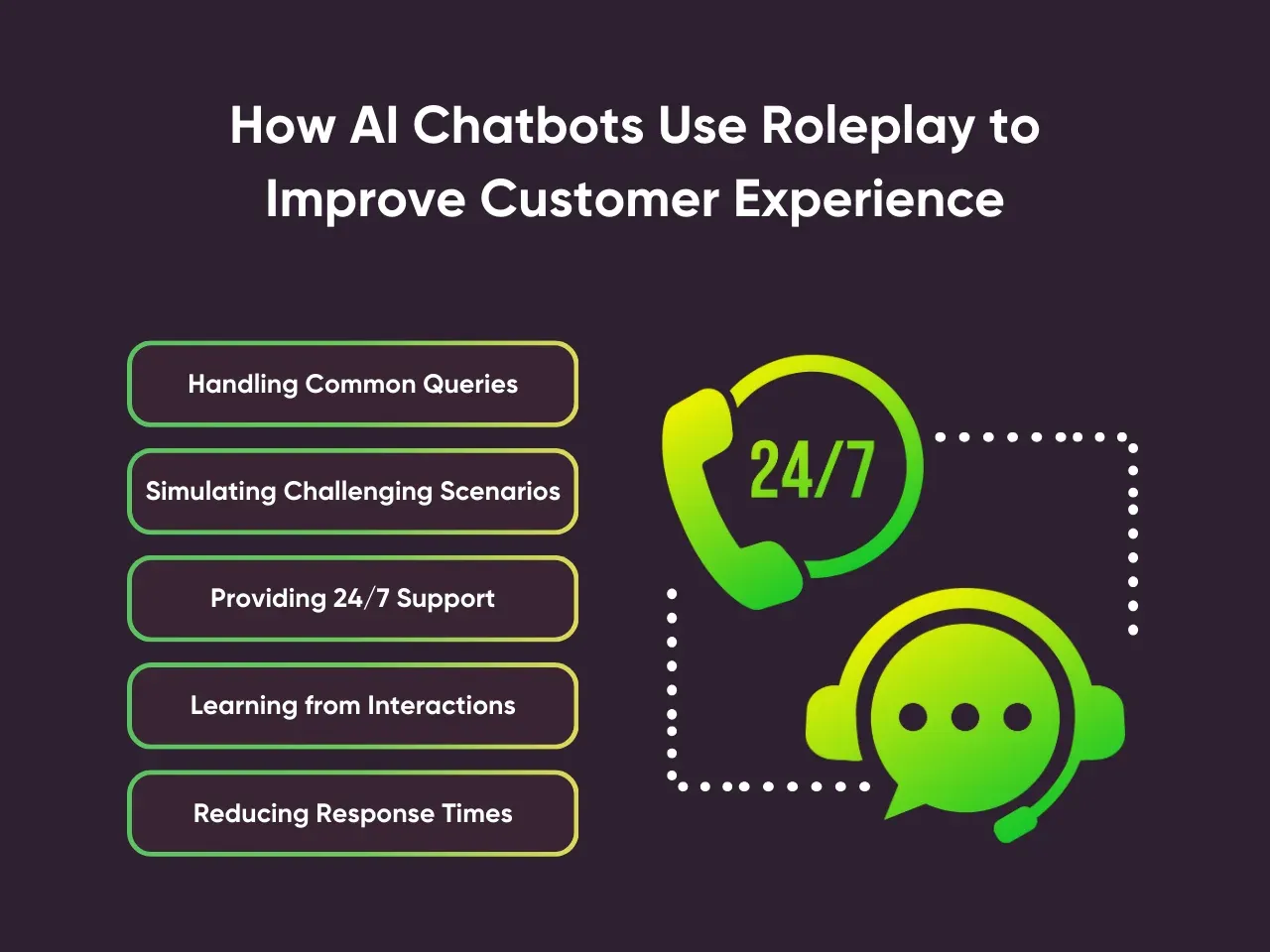
- Handling Common Queries: AI chatbots are trained to roleplay frequently asked questions, providing instant answers to routine issues. This saves time for both the customer and the business.
- Simulating Challenging Scenarios: Chatbots can mimic more complex situations, such as troubleshooting technical problems. Through roleplay, they can guide customers through step-by-step solutions, which can reduce frustration.
- Providing 24/7 Support: Roleplay functionality allows AI chatbots to offer round-the-clock customer service. They can replicate real-time conversations, ensuring customers receive assistance even when human agents are unavailable.
- Learning from Interactions: AI chatbots use roleplay to learn from previous customer interactions. They adapt based on past scenarios and improve their ability to respond effectively in future conversations.
- Reducing Response Times: Chatbots can respond quickly to customer concerns by roleplaying common issues. This streamlines interactions, freeing human agents to focus on more complex matters, which enhances overall efficiency.
Key Considerations for Implementing AI Chatbot Roleplay
Businesses must consider several factors when incorporating AI chatbot roleplay into customer service.
- Ensuring Accurate Roleplay Scenarios: AI chatbots must simulate realistic conversations based on customer data. The more accurate the roleplay scenarios, the better the chatbot will perform.
- Balancing Automation and Human Interaction: While AI chatbots handle basic queries, human agents must still manage more sensitive or complex cases. A balance between automation and personal service ensures higher customer satisfaction.
- Training for Complex Situations: Companies use AI chatbots to train staff for difficult situations. Roleplay scenarios prepare agents for handling challenges, boosting their ability to manage customer concerns effectively.
AI chatbots, through roleplay, offer businesses an invaluable tool for improving customer service. They simulate everyday interactions, provide round-the-clock assistance, and streamline customer service processes. By handling simple queries, chatbots free up human agents to tackle more challenging situations, creating a more efficient and satisfying customer experience.
4. AI Chatbot Roleplay in Corporate Training
AI chatbots are becoming essential tools in corporate training programs. They allow employees to engage in interactive, real-life scenarios that develop key skills like communication, leadership, and teamwork. These AI-powered bots simulate workplace situations, helping employees improve in a safe, controlled environment without real-world consequences.
Key Applications of AI Chatbots in Corporate Roleplay
AI chatbots can assist businesses across various training areas. They provide immediate feedback, boost engagement, and create more effective learning experiences.
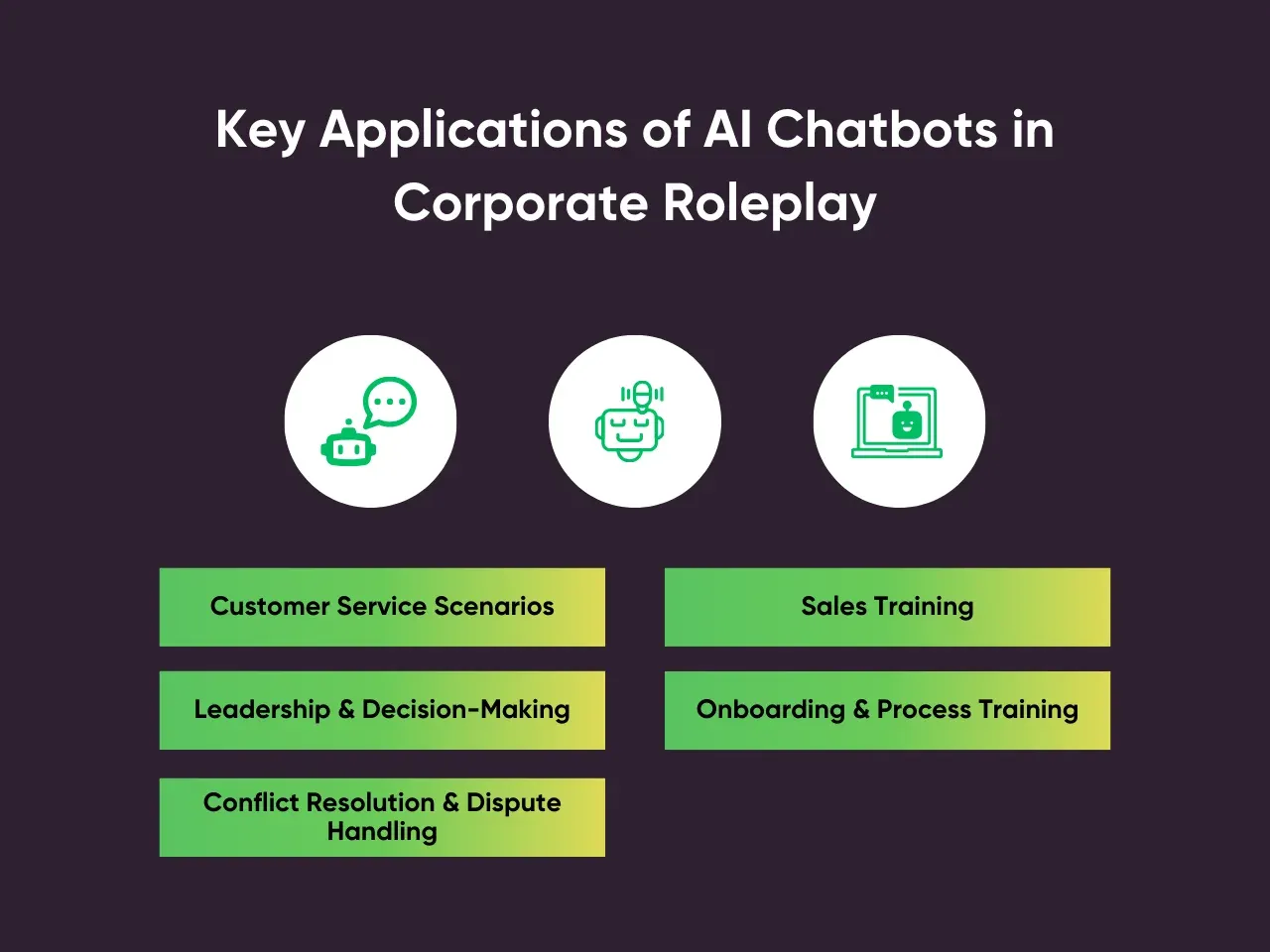
- Simulating Customer Service Scenarios: Chatbots are highly effective in recreating customer service challenges. Employees can practice resolving customer complaints, offering solutions, and maintaining professionalism without real-time pressure.
- Leadership and Decision-Making Practice: AI roleplay helps employees practice making decisions under pressure. They offer opportunities to handle leadership tasks like delegating responsibilities or resolving team conflicts.
- Conflict Resolution and Dispute Handling: Chatbots simulate workplace conflicts, allowing employees to practice conflict resolution techniques. This approach helps improve workplace harmony and teaches how to resolve disputes diplomatically.
- Sales Training: Sales teams benefit from AI chatbots simulating client negotiations and product presentations. Trainees practice their pitch, objections handling, and closing techniques, leading to more confident sales strategies.
- Onboarding and Process Training: New employees can interact with chatbots to learn about company policies, procedures, and workplace culture. The chatbot provides a guided, interactive experience, ensuring new hires are well-prepared before stepping into their roles.
AI chatbots offer immense value in corporate roleplay training by simulating real-life business scenarios. Employees gain hands-on experience handling challenging situations, making better decisions, and improving communication. These chatbots ensure employees can practice critical skills without risk, fostering a stronger, more capable workforce ready to handle the complexities of their roles.
Steps to Implement AI Chatbot Roleplay in Your Organization
Implementing AI chatbots for roleplay training requires careful planning and execution. Below are the steps to follow.
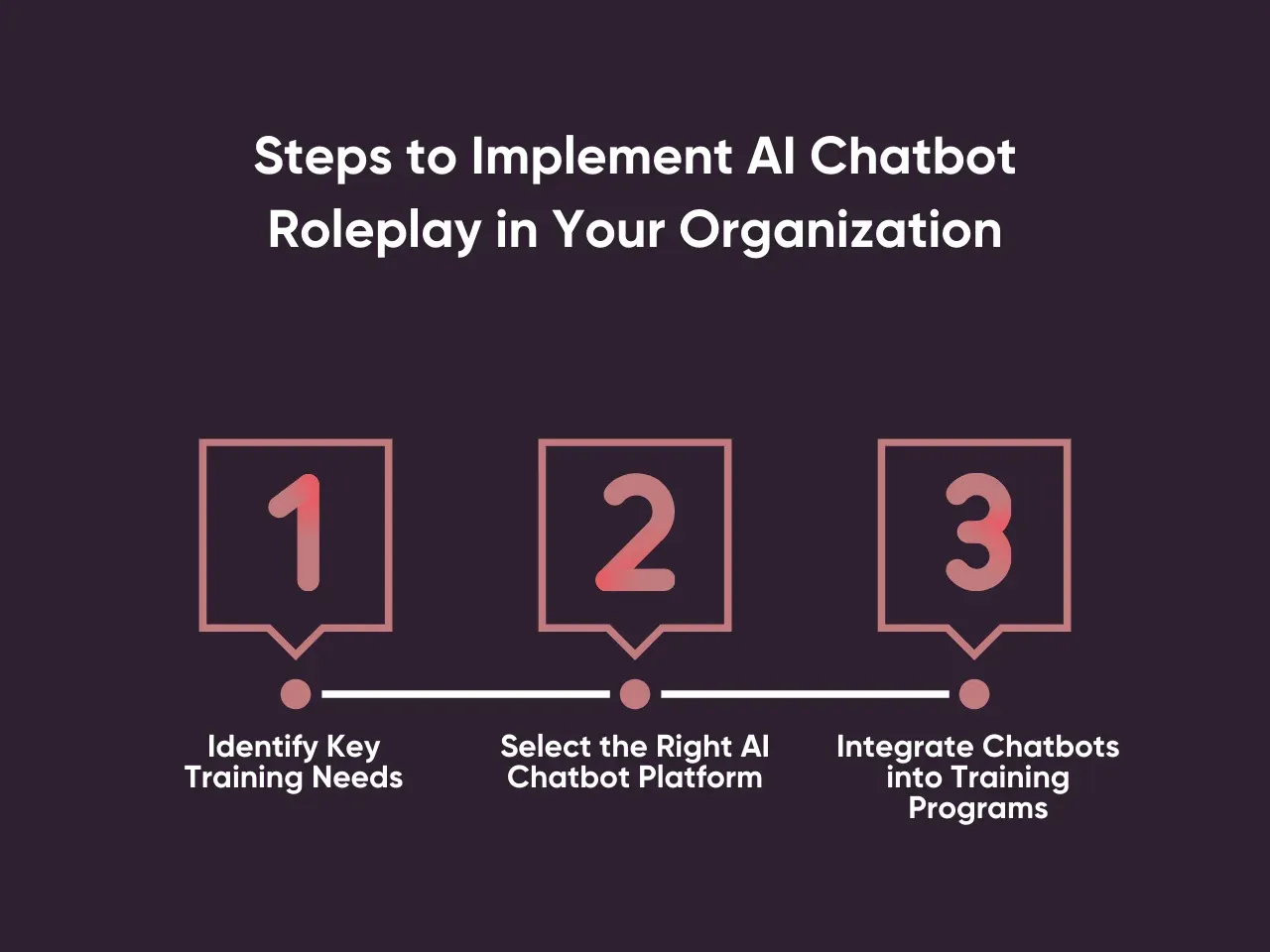
- Identify Key Training Needs: Begin by analyzing your training objectives. Determine where employees require the most practice—leadership, customer service, or onboarding.
- Select the Right AI Chatbot Platform: Choose an AI chatbot platform that aligns with your organization’s training needs. Ensure it has features that effectively simulate real-life business scenarios.
- Integrate Chatbots into Existing Training Programs: Integrate AI chatbots into your current system rather than building new training programs from scratch. This approach makes implementation smoother and increases employee engagement with the training.
AI chatbot roleplay offers companies a powerful tool for improving workplace skills in real-time scenarios. Whether it’s handling disputes, improving leadership skills, or enhancing sales tactics, AI-driven training leads to more confident and capable employees. Integrating chatbots into existing programs can streamline their training process and achieve long-term benefits in employee development.
5. AI Chatbot Roleplay in Entertainment and Gaming
AI chatbots play a key role in enhancing entertainment and gaming experiences. They create dynamic interactions between players and the game world, leading to more immersive and personalized adventures.
Impact of AI Chatbots on Entertainment and Gaming Experiences
AI chatbots have transformed the way players engage with games. They offer new ways to interact with characters, shape narratives, and enjoy unique gaming experiences.
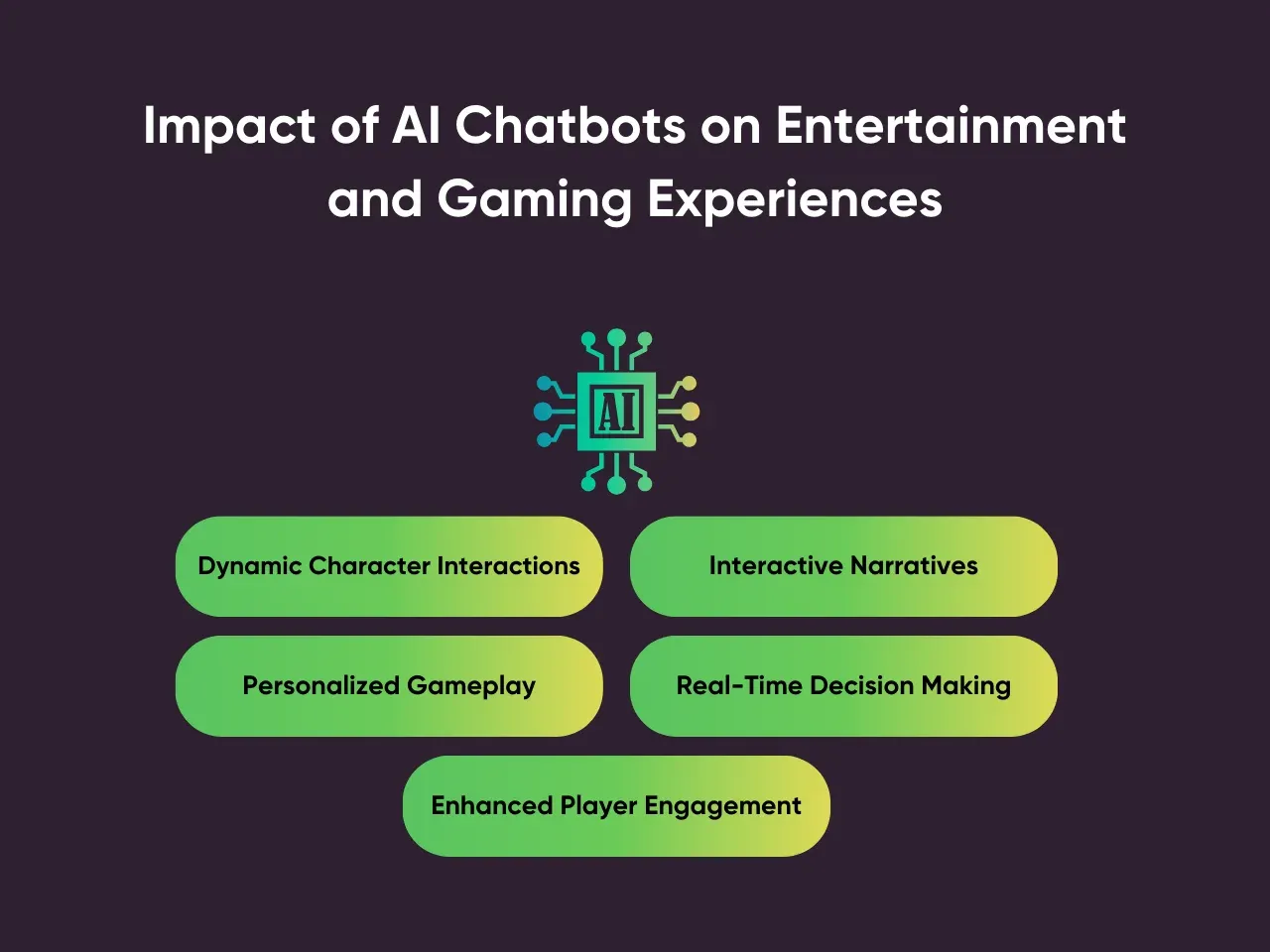
- Dynamic Character Interactions: AI chatbots bring in-game characters to life. They respond to real-time player actions and choices, creating more engaging and interactive experiences. These characters can adapt their dialogue and behavior based on player input.
- Interactive Narratives: Through AI chatbots, players influence storylines. Chatbots allow players to make choices that directly impact the plot, leading to multiple possible outcomes. This adds depth to the narrative, making the player feel more involved.
- Personalized Gameplay: AI chatbots adapt to player preferences. As players progress, these bots adjust the difficulty, tasks, and overall experience based on individual play styles. This can provide a custom experience tailored to each user.
- Real-Time Decision Making: AI chatbots enable players to make decisions during gameplay. They present choices and challenges that require quick thinking, adding an extra layer of excitement and urgency.
- Enhanced Player Engagement: AI chatbots foster continuous engagement. Their ability to create immersive roleplay and adaptive storytelling keeps players invested, ensuring longer gaming sessions.
AI chatbot roleplay revolutionizes entertainment and gaming experiences. These bots provide dynamic characters, adaptive narratives, and personalized gameplay. Integrating AI creates interactive experiences that keep players engaged and connected to the virtual world.
Key Takeaway
AI chatbot roleplay offers personalized and immersive experiences that transform industries like education, healthcare, and entertainment. Through real-time simulations and interactive scenarios, businesses can engage users more effectively. This capacity for customization allows organizations to create tailored learning, customer service, and entertainment experiences. Moreover, Unfiltered AI chat brings a unique edge, providing more profound and flexible conversations.
From training AI chatbots to handling specific roles to streamlining processes, this type of technology can adapt to industry needs, boosting productivity and efficiency. As a result, these customizable, responsive chatbots surpass traditional methods and provide innovative solutions that tackle the challenges faced by modern businesses.
Are you ready to explore the potential of AI chatbot roleplay? At Kindroid, we help you create your own AI experience that fits your business needs. Experience cutting-edge chatbot development with our unfiltered AI chat solutions designed to meet your unique requirements.
